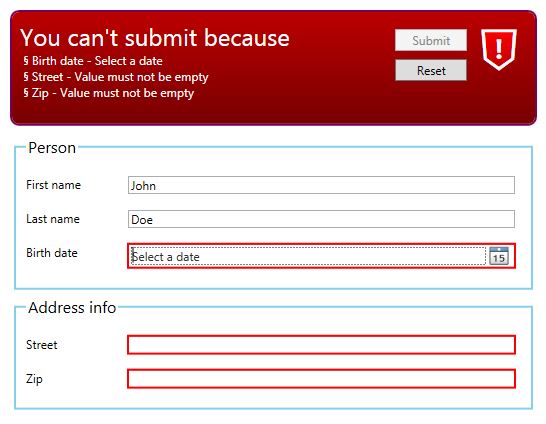See my blog post on why I consider Formlets to a very important idea: https://mrange.wordpress.com/2014/10/26/building-forms-fast-using-formlets/
The major inspiration for this library comes from WebSharper (https://github.com/intellifactory/websharper).
WebSharper demonstrated how powerful a, so called, Formlet can be to represent an interactive form.
WebSharper impressed so much that we think Formlets are the current best way to represent interactive forms in F#.
Formlets are awesome because:
- They are functionally idiomatic, that means they feel right in a functional language such as F#
- They are endlessly composable. That means any formlet can be combined with any other formlet to produce a new formlet.
- Using formlets it's trivial to create highly interactive forms.
// Defines how to input personal information
let person =
formlet {
let! firstName = LabeledText "First name" "John"
let! lastName = LabeledText "Last name" "Doe"
let! birthDate = LabeledDateTime "Birth date" None
return firstName, lastName, birthDate
}
|> Enhance.WithLegend "Person"
// Defines how to address information
let address =
formlet {
let! street = LabeledText "Street" ""
let! zip = LabeledText "Zip" ""
return street, zip
}
|> Enhance.WithLegend "Address info"
// Combines the personal and address info formlets and adds an error summary
// Two formlets combined results in a new formlet which in turn can be combined
// And so on...
let f =
formlet {
let! firstName, lastName, birthDate = person
let! address = address
return firstName, lastName, address,
}
|> Enhance.WithErrorSummary
This defines a form like below:
While this is rather static what's really great with Formlets is the ease how you can build Forms that react to different input. The simplest way would be an if expression
let f =
formlet {
let! country = LabeledText "Country" "SWEDEN"
let! orgNo = LabeledText "Org no" ""
let! mva =
// In Norway a company needs to have an MVA number in addition to the OrgNo
if country = "NORWAY" then
LabeledText "MVA" ""
else
Formlet.Return "N/A"
return country, orgNo, mva
}If country is "NORWAY" the MVA input textbox is shown, otherwise not.
A slightly more interesting example involves the Option input:
let empty =
formlet {
return "", None
}
let sweden =
formlet {
let! orgNo = LabeledText "Org no" ""
return orgNo, None
}
let norway =
formlet {
let! orgNo = LabeledText "Org no" ""
let! mva = LabeledText "MVA" ""
return orgNo, Some mva
}
let companyInfo =
let options = LabeledOption "Country" empty [|"Sweden", sweden; "Norway", norway|]
formlet {
let! name = LabeledText "Name" ""
// The user selects an option that evaluates into a formlet
let! country = options
// This invokes the selected formlet presenting the user a different
// form depending on the selected option
// This is just mind-boggling cool and succinct
let! orgNo, mva = country
return name, orgNo, mva
}
|> Enhance.WithLegend "Company info"It's very important to have an extensibility story and FSharp.Client.Formlet is designed to not be locked into to a special platform.
Obviously the various adaptations are tied to a platform but the core is agnostic.
In addition, it shall be possible for a user of FSharp.Client.Formlet to extend with custom formlets that combines like the other formlets.
It's preferable if creating a formlet isn't overly hard.
/// The visual element of the text input formlet
type InputTextElement(initialText : string) as this =
inherit TextBox()
let mutable text = initialText
do
this.Text <- initialText
this.Margin <- DefaultMargin
member val ChangeNotifier = EmptyChangeNotification with get, set
override this.OnLostFocus(e) =
base.OnLostFocus(e)
if text <> this.Text then
text <- this.Text
this.ChangeNotifier ()
/// The text input Formlet
let Text initialText : Formlet<FormletContext, UIElement, string> =
let eval (fc,cl,ft : FormletTree<UIElement>) =
let e =
match ft with
| Element (:? InputTextElement as e) -> e
| _ ->
InputTextElement(initialText)
e.ChangeNotifier <- cl
(FormletResult.Success e.Text), Element (e :> UIElement)
FormletMonad.New eval
